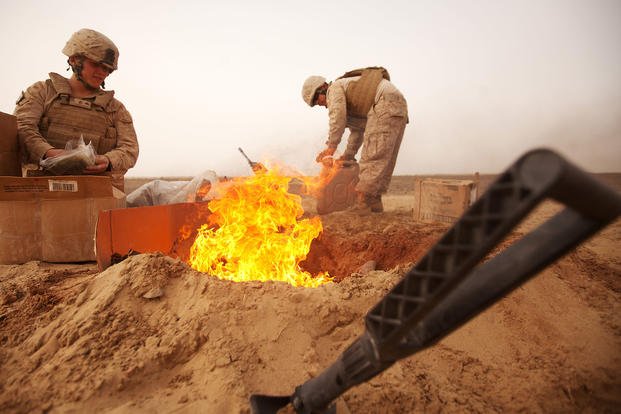The Senate Veterans Affairs Committee's mammoth toxic exposure package will deliver presumptive care for 11 conditions for veterans sickened by exposure to burn pits and other toxins, Military.com has learned.
The True Cost of War Recognition Act will be the culmination of a year's worth of bills proposed in the Senate, ranging from incremental improvements to delivering care and disability compensation to the estimated 3.5 million veterans exposed to burn pits abroad. It would be one of the most consequential health care bills in years.
The effort to deliver presumptive care amounts to a policy ultramarathon with VA committee leaders marking toxic exposure as the top issue, knowing any major effort will require an enormous amount of funding over the next century. The influx of patients also could be a monumental challenge for the Department of Veterans Affairs.
Read Next: Active-Duty Marine Major Arrested After Allegedly Pushing Police Officer in Capitol Riot
But lawmakers are trying to act fast, fearing a repeat of the decades-long struggle the Vietnam War generation had to fight for health care and disability compensation.
Sen. Jon Tester, D-Mont., aims to have the bill out of committee and delivered to the full Senate by Memorial Day. He said he's confident the package will become law this year.
"I wouldn't take this run at it if the odds weren't good. We've needed this bill for a long time," Tester, who chairs the Senate Veterans Affairs Committee, said in an interview with Military.com
The Senate is expected to formally announce the bill soon. The House has not yet unveiled its toxic exposure package, which takes bits from 15 different bills. Both bills are expected to breeze through the Veterans Affairs committees.
The two chambers will have to come together and negotiate a compromise bill for a final vote and send it to President Joe Biden's desk to be signed into law.
"I think this is the biggest expansion of veteran care, ever," Tester said.
Health conditions covered under presumptive care, according to a draft copy of the bill obtained by Military.com:
- Asthma that was diagnosed after service which awarded a qualifying medal
- Chronic obstructive pulmonary disease (COPD)
- Chronic bronchitis
- Constrictive bronchiolitis or obliterative bronchiolitis
- Emphysema
- Pleuritis
- Pulmonary fibrosis
- Interstitial lung disease
- Sarcoidosis
- Respiratory cancer of any type
- Glioblastoma
Right now, veterans who believe they were sickened by exposure can get care from the VA. However, they must establish their condition is connected to service. Proving they served near a burn pit can be nearly impossible in many circumstances. Given that, the Senate's package aims to give presumptive care to any veteran who deployed to war zones, requiring only a record of service medals for proof.
Eligibility for presumptions include veterans who served after Aug. 2, 1990, and received at least one of the following awards:
- Afghanistan Campaign Medal
- Armed Forces Expeditionary Medal
- Global War on Terrorism Expeditionary Medal
- Inherent Resolve Campaign Medal
- Iraqi Campaign Medal
- Southwest Asia Service Medal
One veterans advocate who spoke on the condition of anonymity said that not enough conditions are covered. And while the bill is a solid start, it's a far cry from other proposals.
The list of covered conditions is much shorter than other proposed bills -- including one from Sens. Kirsten Gillibrand, D-N.Y., and Marco Rubio, R-Fla. -- and neglects a host of illnesses covered under a law that delivers care for the victims of 9/11, which served as a blueprint for burn pit legislation.
The bill establishes a commission to advise the VA secretary on toxic exposure issues and make recommendations to add new presumptions. It gives the secretary 60 days to respond.
The VA secretary has the power to add to the list of covered health conditions, a senate aide told Military.com. The final list is the result of delicate negotiations and trying to pinpoint what illnesses are most likely the result of exposure.
The aide said the White House has largely stayed out of the issue publicly to let Congress sort out the details. Biden is expected to be a key ally on the burn pit issue; he believes his son Beau died from burn pit exposure after his deployment to Iraq.
But the elephant in the room is the legislation's cost. Tester said he doesn't believe the unprecedented government spending this year impacts the bill's odds one way or another. But Tester, along with other lawmakers and advocates involved in the issue, say the cost is simply the government paying its war tab.
"The cost is probably going to be a snag," he said. "But this is the cost of war, and folks who aren't gonna take care of the vets sure as hell shouldn't vote to send them to war."
It's unclear how many veterans are sick from burn pits or have died from related illnesses. VA data shows 72% of the 15,640 burn pit-related claims since 2007 were denied. However, the data is murky at best. The agency largely got it from a word search for phrases like "burn pits" in its patient database. That means if a veteran's medical record never specifically referenced burn pits, it's unlikely to be represented in the data.
Meanwhile, out of the 2.5 million Global War on Terrorism veterans, 781,384 have filed claims related to respiratory issues. According to VA data obtained by Military.com, 63% were granted. Of all the GWOT veterans, 42,686 filed for claims related to cancer; 37% of those claims were granted.
The VA's research shows GWOT veterans are three times more likely than non-deployed veterans to file claims related to respiratory issues and twice as likely to file claims for cancer.
Editor's Note: This story has been updated to clarify the White House stance on the bill.
-- Steve Beynon can be reached at Steve.Beynon@military.com. Follow him on Twitter @StevenBeynon.
Related: Why 2021 Could Be a Game-Changing Year for Veterans Sickened by Burn Pit Exposure














